The Coffee Circle Papers: Paper 2 – New Century Socialism: Fighting for Justice in the Jungle
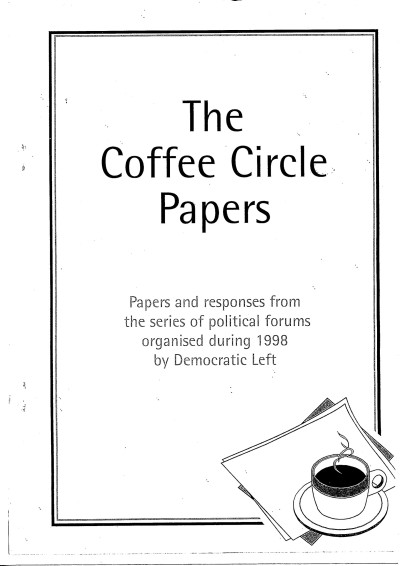
| Date: | 1998 |
|---|---|
| Organisation: | Democratic Left |
Contributors:
Info | Rosheen Callender, Des Geraghty, Seamus Murphy |
| Type: | Chapter |
| View: | View Document |
| Discuss: | Comments on this document |
| Subjects: |
Please note: The Irish Left Archive is provided as a non-commercial historical resource, open to all, and has reproduced this document as an accessible digital reference. Copyright remains with its original authors. If used on other sites, we would appreciate a link back and reference to The Irish Left Archive, in addition to the original creators. For re-publication, commercial, or other uses, please contact the original owners. If documents provided to The Irish Left Archive have been created for or added to other online archives, please inform us so sources can be credited.
Commentary From The Cedar Lounge Revolution
17th July 2023
Many thanks to Catherine Murphy TD for donating this document to the Left Archive. The document has been posted as the specific chapters which can be found here. As noted previously:
This document [published on foot of a series of meetings] is unusual in respect of the Irish left in that it sought to challenge fairly directly the assumptions held by a political formation. That formation, Democratic Left, less than a decade old had recently left government after Fianna Fáil had won the 1997 General Election. It had also shed two seats from its complement of six TDs.
This document examines the economy and has a paper presented by Des Geraghty and another by Seamus Murphy, financial journalist. As with other excerpts from the overall compilation there is far too much text to give any more than a flavour of the contributions.
Geraghty argues.
For me, democratic socialism must be the political expression of a truly egalitarian value system which determines a particular approach to politics, economics, social policy and the environment. To be sustainable – or credible – it must be deeply rooted in a world view which demands equality and justice for all human beings, irrespective of race, creed, class or gender. It must be informed by the belief that human society can cater for everyone’s need but not for everyone’s greed; that people are naturally disposed to care 1or and share with each other; that by working together we can provide sustenance, jobs, shelter, security, and the opportunity for personal and collective expression and cultural achievement.
He also suggests:
It is against these yardsticks that I measure all political, economic or social theory, and assess the value of the European market, the trees in the Glen of the Downs, or the so-called Celtic Tiger. Thesee are the yardsticks that I apply to the debate on market or non-market economies, state ownership of public utilities, central planning, class struggle, national liberation, or political democracy. These are how I measure human progress.
Equally, I believe it was the departure from these essential human values that doomed the Soviet model of socialism to failure, and will in time undermine the liberal market capitalism of our own time.
I make this assertion because of the self-evident destructive potential inherent in the unrestrained values of individualism – not individuality, which I value greatly – and the exercise of avarice, exploitation, environmental destruction, injustice, over consumption, power, privilege, and abuse of human rights which permeates so-called ‘free market’ capitalism.
He examines various examples of ‘free’ markets and argues:
We must challenge continually the ‘myth of the market’ which· is constantly promulgated to oppose political attempts at redistribution of wealth or the establishment of social protection_. We must point out that leaving everything to the market is a political choice of conservatives, and usually those with strong vested interests and extensive economic power in the market already.
There is no single market. But there is scope for a variety of approaches to open markets, partial markets with significant regulation, and non-market sectors for such essential services as welfare, health, education and social housing. These are practical choices, the means to an end. Essentially, markets must be part of a democratically regulated economic and social order: a system which prevents monopoly, the abuse of economic power, and the absence of transparency, accountability and social responsibility. Markets must be a mechanism of -and not the master of -political life, and the role of politics must be to ensure the mastery of people over profit.
And he argues that there is a need to work towards a ‘New Left Economics’.
Murphy contends.
I would not dissent from anything contained in Des’s paper, but would rather argue for a different and very specific focus on the politics of financial markets in particular.
And:
So, is it hopeless? Should we surrender, throw in the towel? No, but we have got to realise that these people are massively more powerful than they were 20 years ago. That is why Tony Blair is no Ernest Bevin and Bill Clinton resembles FD Roosevelt only in the libidinous region. They are· what the market will tolerate. They have public expenditure under control.
Politicians of all kinds have much less power than they had a generation ago. The political arena -the democratic space -has shrunk, and is still shrinking. The mills of the market grind exceedingly small. They are not satisfied with their current level of political power, they never will be satisfied. Remember, it’s not personal, the dealers are doing their job. It is the nature of the beast.
And:
There are signs in several parts of the world that there is at last a fracture, between markets as useful mechanisms and the neo-liberalist claptrap of the resurgent right which has dominated the last 20 years -what George Bush called voodoo economics. Into this space, this fracture, we can insert a new politics -a new socialism for the new millennium. Markets as such do not frighten us, except when they try to subvert our democracy. I leave you with one thought -is not the whole history of socialism composed of the struggle to bring market mechanisms under democratic control? It is one way of looking at it.
In summation Rosheen Callender, economist with SIPTU and Special Advisor to Proinsias De Rossa when he was the Minister for Social Welfare, and the moderator argues:
Most speakers saw competition and market forces as part of today’s economic furniture. The challenge was to shape and control them; to force them, if necessary, to meet peoples’ needs – but not to keep denying, or railing against, the fact of their existence. Others were less ready to accept this, believing that ultimately it’s impossible to control market forces; therefore they cannot and must not be accepted. However, one such speaker added, somewhat sadly, that he couldn’t really offer any convincing alternative.
The facilitator of the discussion was Nuala Keher of the Open Learning Centre in UCG.
More from Democratic Left
Democratic Left in the archive
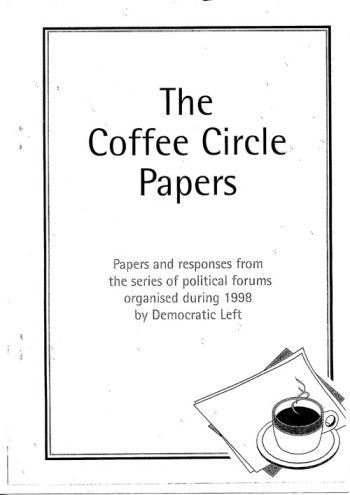
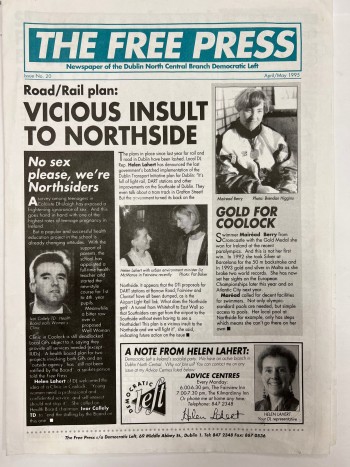
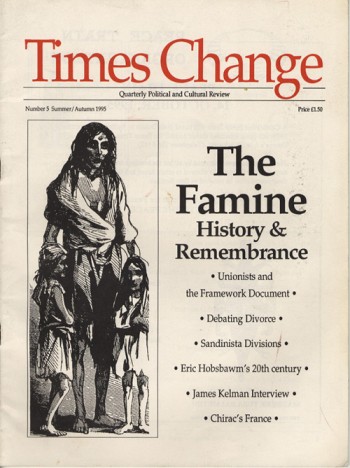
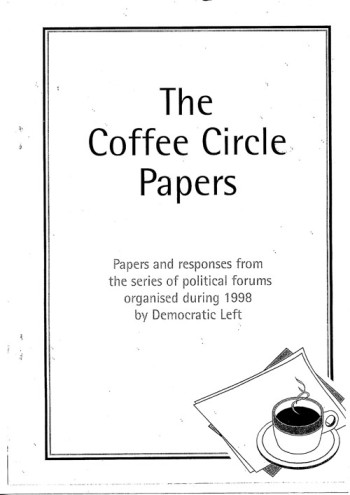
Comments
No Comments yet.
Add a Comment
Comments can be formatted in Markdown format . Use the toolbar to apply the correct syntax to your comment. The basic formats are:
**Bold text**
Bold text
_Italic text_
Italic text
[A link](http://www.example.com)
A link
You can join this discussion on The Cedar Lounge Revolution
By: WorldbyStorm Wed, 19 Jul 2023 09:23:45
In reply to Colm B.
It really did become a life support for TDs didn’t it?
Reply on the CLR
By: WorldbyStorm Wed, 19 Jul 2023 09:26:44
In reply to Fergal.
In a way that’s no win though isn’t it? We have no choice in that regard but that said yep something v middle class about Coffee Circle as a term.
Reply on the CLR
By: Fergal Wed, 19 Jul 2023 09:37:19
In reply to WorldbyStorm.
Think the coffee circle usage could be linked to the golden circle that was much in use then, if my chronology is correct?
I think within capitalism alternatives exist … and it’s by creating and supporting viable alternatives to capitalism that we can try to exist outside capitalism.
I’m reading Braudel’s Grammar of civilisation now and he’s emphasising the huge differences between a market and capitalism, must be influencing my comment above 😂
Reply on the CLR
By: banjoagbeanjoe Wed, 19 Jul 2023 09:50:39
In reply to Fergal.
All this reminds me of a great bit of graffiti I saw in London once. It was a billboard ad for Maxwell House Coffee. It pictured a Sth American campesino working in a coffee plantation with a big sack on his back. The slogan was: “He only knows three words of English – Maxwell House Coffee”. The graffitist had spray painted out those three words and replaced them with Yankee Go Home.
Reply on the CLR
By: roddy Wed, 19 Jul 2023 15:10:49
In reply to Colm B.
Brian Hayes joined DL due to it’s neo unionism.
Reply on the CLR
By: banjoagbeanjoe Wed, 19 Jul 2023 16:34:32
In reply to Colm B.
“lots of people got rewarded with membership of official boards etc.”
And two, McCartan and White, got jobs as judges.
Reply on the CLR
By: banjoagbeanjoe Wed, 19 Jul 2023 17:15:46
In reply to Colm B.
“There was an influx of mainly middle class people into DL who really were well, just liberals,”
I think that process had started within the WP years before DL was established. I guess those leftish liberals in WP were guaranteed to join DL when the split happened.
I know one person, a neighbour, who I believe joined DL after it started up, never having been in WP. This person certainly fits the bill of middle class liberal, not socialist.
Reply on the CLR